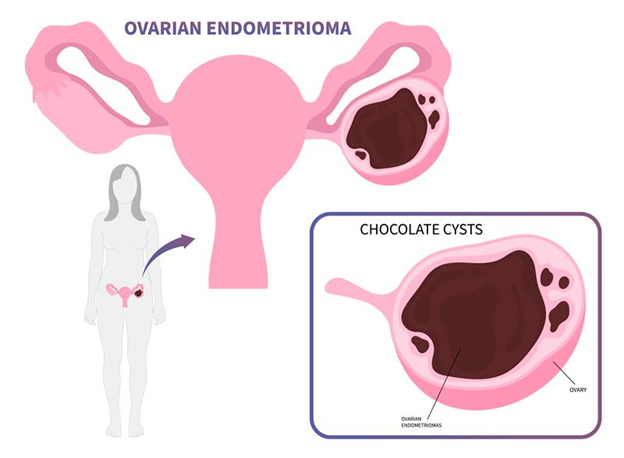Chocolate cysts, also known as endometriomas, are a vital focus in women’s health. These cysts form due to endometriosis, where the tissue resembling the uterine lining grows outside the uterus, often affecting the ovaries. Understanding and spreading awareness about this condition is crucial, as early diagnosis leads to better management of symptoms and potential complications like infertility.

Chocolate cysts are significant in women’s health due to their potential impact on daily life and reproductive health. The sooner these are detected and addressed, the better the chances are for a woman to experience less discomfort and maintain her fertility.
Overall, comprehending the causes and symptoms of chocolate cysts (endometriomas) allows women to seek timely medical advice, ensuring effective interventions and strategies for improved quality of life.
What Are Chocolate Cysts?
Chocolate cysts, named for their dark, thick fluid resembling chocolate syrup, form when endometrial tissue grows in the ovaries. They are cystic formations resulting from a specific type of endometriosis.
These endometriomas appear as fluid-filled sacs and are stage-specific parts of endometriosis affecting the ovaries. Their surfacing is often associated with retrograde menstruation, where menstrual flows backward.
Causes of ovarian endometrioma stem from an abnormal growth of the endometrial lining, leading to the ovarian vicinity, causing these cysts. Other causes include hormonal imbalances and immune system dysfunctions.
Women with a genetic predisposition or a family history may be more susceptible to developing chocolate cysts. Environmental factors like diet and exposure to certain chemicals can also play a role in the development of these cysts.
Common Symptoms and Health Implications
Typical chocolate cyst symptoms can significantly alter a woman’s daily life. These symptoms include:
- Severe pelvic pain
- Chronic cramps
- Pain during menstrual cycles
Some women also experience irregular periods, nausea, and fatigue. These symptoms could indicate the presence of a chocolate cyst and may act as a precursor to infertility issues.
The impact of chocolate cyst on fertility arises because they directly affect the ovaries, sometimes leading to blockages or damage that complicates conception. Women experiencing such symptoms should consult a healthcare provider promptly as early intervention can curb further health implications.
Correctly identifying these symptoms and understanding their extent is vital for seeking appropriate treatment and improving fertility outcomes.
Causes and Risk Factors of Chocolate Cysts
The primary causes of chocolate cysts hinge on factors like retrograde menstruation, leading to endometriosis. Further causes of ovarian endometrioma include a hormonal imbalance or immune system issues that promote abnormal tissue growth in the ovaries.
Genetic predisposition plays a significant role. Women with direct relatives who had endometriosis are at a higher risk of developing endometriomas. Environmental influences, such as exposure to toxins or a poor diet, may amplify these risks.
Considering these potential causes can aid in understanding personal risk levels, enabling women to seek regular check-ups and preventive measures effectively.
Managing and Treating Chocolate Cysts
Endometrioma treatment options encompass both medical and surgical solutions. Medical treatments primarily involve hormone therapy to regulate menstrual cycles and shrink cysts.
Surgical options, like laparoscopic removal, may become necessary for larger cysts or when fertility is threatened. Endometrioma surgery recovery varies but can lead to significant improvement in symptoms.
Natural management methods are also available. Women often look for how to treat chocolate cyst naturally through lifestyle adjustments. Considerations include:
- Anti-inflammatory diet changes
- Herbal supplements
- Stress management techniques
These natural avenues, supported by consistent medical advice, can enhance treatment outcomes, improving overall well-being.
Understanding the diet for chocolate cyst management can also help manage symptoms. Key dietary changes include:
- Consuming more fruits and vegetables
- Reducing red meat intake
- Avoiding caffeine and alcohol
For many women, adopting a balanced diet can complement medical treatments, offering a holistic approach to managing chocolate cysts.
Seeking Medical Advice and Finding Support
Prompt medical consultation is crucial when experiencing signs of chocolate cyst symptoms such as severe pelvic pain and menstrual irregularities. Ignoring these signs can lead to complications like infertility or severe pain.
Routine check-ups serve as an excellent preventive measure against the severe impacts of chocolate cysts. Regular monitoring can help manage the cysts before they become unmanageable.
Finding support among peers or through online resources is beneficial. Women’s health groups, both local and online, offer shared experiences and strategies, valuable during the treatment journey.
Discussing experiences with healthcare providers not only provides medical guidance but also emotional support throughout the treatment process. Comprehensive support aids in managing the challenges posed by chocolate cysts and pregnancy risks, fostering a more positive outlook and better health management.
In conclusion, by understanding chocolate cysts, their symptoms, and treatment, women can expertly navigate their options for a healthier life. Seeking timely intervention and discussing openly with healthcare providers leads to informed decisions and better health outcomes.
Take Charge of Your Reproductive Health at Gayatri Maternity Nursing Hospital
If you’re experiencing symptoms like pelvic pain or irregular periods, don’t wait—early diagnosis and treatment of chocolate cysts (endometriomas) can protect your fertility and improve your quality of life.
- Comprehensive evaluation and expert care
- Advanced diagnostic and treatment options
- Personalized plans to support your well-being and family goals
Call Gayatri Maternity Nursing Hospital today to schedule your consultation or
Book online for discreet and compassionate care.
Gayatri Maternity Nursing Hospital — Caring for women’s health with expertise and compassion.

